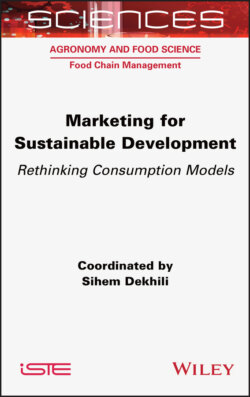Читать книгу Marketing for Sustainable Development - Группа авторов - Страница 24
1.6. References
ОглавлениеAmine, A. and Gicquel, Y. (2011). Rethinking resistance and anti-consumption behaviours in the light of the concept of deviance. European Journal of Marketing, 45(11/12), 1809–1819.
Badot, O. and Cova, B. (2008). The myopia of new marketing panaceas: The case for rebuilding our discipline. Journal of Marketing Management, 24(1/2), 205–219.
Baudrillard, J. (1970). La société de consommation. Denoël, Paris.
Benhallam, M. (2016). La résistance socialement responsable à la consommation : proposition de conceptualisation et implications pour les pratiques du marketing. PhD thesis, Université Paris-Est Créteil, Créteil.
Daniel, M., Siriex, L., Bricas, N., Figuié, M. (2008). Du choix des produits aux styles de vie : un repérage élargi des modalités de résistance des individus pour un développement durable. In Colloque consommation et résistance. Université Paris-Est Créteil, Créteil.
Dobscha, S. (1998). The lived experience of consumer rebellion against marketing. Advances in Consumer Research, 25, 91–97.
Dubuisson-Quellier, S. (2009). La consommation engagée. Presses de la Fondation nationale des sciences politiques, Paris.
Firat, A.F. and Venkatesh, A. (1995). Liberatory postmodernism and the reenchantment of consumption. Journal of Consumer Research, 22(3), 239–267.
François-Lecompte, A. and Valette-Florence, P. (2006). Mieux connaître le consommateur socialement responsable. Décisions Marketing, 41, 67–79.
Hewer, P. and Brownlie, D. (2007). Cultures of consumption of car aficionados: Aesthetics and consumption communities. International Journal of Sociology and Social Policy, 27(3/4), 106–119.
Kassarjian, H.H. (1971). Incorporating ecology into marketing strategy: The case of air pollution. Journal of Marketing, 35(3), 61–65.
Koskenniemi, A. (2019). Deviant consumption meets consumption-as-usual: The construction of deviance and normality within consumer research. Journal of Consumer Culture, September 12.
Kozinets, R.V. (2012). Netnography: Doing Ethnographic Research Online. Sage, London.
Manrai, L.A., Manrai, A.K., Lascu, D.N., Ryans Jr, J.K. (1997). How green-claim strength and country disposition affect product evaluation and company image. Psychology & Marketing, 14(5), 511–537.
Marion, G. (2003). Idéologie et dynamique du marketing : quelles responsabilités. Décisions Marketing, 31, 49–61.
Mick, D.G., Pettigrew, S., Pechmann, C., Ozanne, J.L. (2012). Transformative Consumer Research for Personal and Collective Well-Being. Routledge, New York.
Monnot, E. and Reniou, F. (2013). “Ras le bol d’entendre parler d’écologie !” : comprendre la contestation des discours écologiques par les consommateurs. Décisions Marketing, 71, 93–109.
Murray, J.B. and Ozanne, J.L. (2009). The critical participant. Journal of Marketing Management, 25(7/8), 835–841.
Nader, R., Ross, D., English, B., Highland, J. (1971). Action for a Change. A Student’s Manual for Public Interest Organizing. Grossman Publishers, New York.
Penaloza, L. and Price, L. (1993). Consumer resistance: A conceptual overview. Advances in Consumer Research, 20, 23–128.
Rabhi, P. (2010). Vers la sobriété heureuse. Actes Sud, Paris.
Roux, D. (2007). La résistance du consommateur : proposition d’un cadre d’analyse. Recherche et applications en marketing, 22(4), 59–79.
Sansaloni, R. (2006). Le non-consommateur. Dunod, Paris.
1 1 Monnot and Reniou (2013) believe that contestation is a medial element in a continuum, where the starting point would be a feeling of skepticism, conducting an expression of resistance as an end point.
2 2 SRR: Socially responsible resistance.
3 3 Available at: https://www.jeuneafrique.com/737259/economie/danone-des-resultats-annuels-enberne-au-maroc-en-raison-du-boycott-de-2018/.
4 4 The Buzz Indicator (BI) refers to the degree of involvement of the community members with a given topic, suggested by the breadth of participation around it (likes, comments and shares). In order to be selected, the BI must be higher than the average of the BIs for a “t” period (from the 1st to the 30th of each month).
5 5 Individuals who are part of a social group consciously and deliberately opposed to a dominant culture through individual or collective actions of varyling levels of visibility.
6 6 Available at: www.recup.net, “Providing a space for getting rid”.
